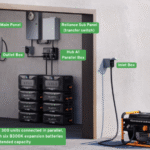Going Off-Grid: Renewable Energy Storage Options for Business
What Does Going Off-Grid Mean?
Going off-grid refers to the process of disconnecting from the traditional grid and relying on alternative energy sources to power your business. This can be achieved through the use of renewable energy systems, such as solar or wind power, and energy storage solutions.
Why Go Off-Grid?
There are several reasons why businesses may choose to go off-grid:
- Reduced energy costs: Renewable energy sources can be more cost-effective than traditional grid power.
- Increased energy independence: By generating your own energy, you’re less reliant on the grid and can better control your energy usage.
- Environmental benefits: Renewable energy sources produce zero emissions, making them a more sustainable option.
- Resilience and reliability: Off-grid energy systems can provide a reliable source of power during outages or emergencies.
Renewable Energy Storage Options
Battery Storage Systems
Battery storage systems are a popular choice for off-grid energy systems. They allow you to store excess energy generated by your renewable energy sources and use it when needed. There are several types of battery storage systems available, including:
- Lithium-ion batteries: These are the most common type of battery storage system and are known for their high energy density and long lifespan.
- Lead-acid batteries: These are a more affordable option and are often used in off-grid energy systems.
- Sodium-ion batteries: These are a newer type of battery storage system that is gaining popularity due to its potential for lower costs and improved performance.
Other Energy Storage Options
In addition to battery storage systems, there are several other energy storage options available:
- Pumped hydro storage: This involves pumping water from a lower reservoir to an upper reservoir during off-peak hours and releasing it during peak hours to generate electricity.
- Compressed air energy storage: This involves compressing air in an underground cavern during off-peak hours and releasing it during peak hours to generate electricity.
- Flywheel energy storage: This involves using a flywheel to store energy kinetically and release it when needed.
Benefits of Renewable Energy Storage
Reduced Energy Costs
Renewable energy storage systems can help reduce your energy costs by allowing you to store excess energy generated by your renewable energy sources and use it when needed. This can be especially beneficial for businesses that have high energy demands during certain times of the day or year.
Increased Energy Independence
Renewable energy storage systems can provide a reliable source of power during outages or emergencies, giving you increased energy independence. This can be especially important for businesses that rely on a consistent supply of power to operate.
Environmental Benefits
Renewable energy storage systems can help reduce your carbon footprint and contribute to a more sustainable future. By storing excess energy generated by renewable sources, you’re reducing the amount of energy that needs to be generated from fossil fuels.
Conclusion
Going off-grid with renewable energy storage options can provide numerous benefits for businesses, including reduced energy costs, increased energy independence, and environmental benefits. By choosing the right renewable energy storage solution for your business, you can reduce your reliance on the grid and contribute to a more sustainable future.
FAQs
Q: What are the most common types of renewable energy storage systems?
A: The most common types of renewable energy storage systems are lithium-ion batteries, lead-acid batteries, and sodium-ion batteries.
Q: How do I determine the right renewable energy storage system for my business?
A: To determine the right renewable energy storage system for your business, you’ll need to consider factors such as your energy usage patterns, the size of your business, and your budget. It’s recommended that you consult with a renewable energy expert to determine the best solution for your business.
Q: Are renewable energy storage systems expensive?
A: Renewable energy storage systems can be expensive, but the cost is decreasing as technology improves. Additionally, the cost savings from reduced energy costs and increased energy independence can make up for the initial investment.
Q: Can I install a renewable energy storage system myself?
A: While it’s possible to install a renewable energy storage system yourself, it’s recommended that you hire a professional to ensure that the system is installed correctly and safely. Additionally, a professional installation can help you take advantage of tax incentives and rebates that may be available for off-grid energy systems.
Q: How long do renewable energy storage systems last?
A: The lifespan of a renewable energy storage system depends on the type of batteries used and the quality of the installation. On average, lithium-ion batteries can last for 10-15 years, while lead-acid batteries can last for 5-10 years. Sodium-ion batteries are still a relatively new technology, but they’re expected to have a lifespan of 10-20 years.



_1.png?w=150&resize=150,150&ssl=1)


(1).png?w=150&resize=150,150&ssl=1)
